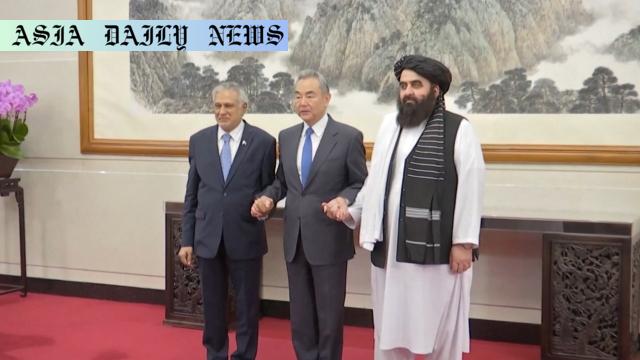China-Pakistan Economic Corridor expands to Afghanistan through collaboration with Pakistan and the Taliban administration.
- China aims to expand its Belt and Road Initiative to Afghanistan.
- Chinese, Pakistani, and Taliban officials agreed to extend the China-Pakistan Economic Corridor to Afghanistan.
- China strengthens ties with Pakistan and the Taliban, seeking greater influence in the region.
- Afghanistan and Pakistan agreed to exchange ambassadors amidst security concerns.

Introduction: Expanding Regional Influence
China’s ambitious Belt and Road Initiative (BRI) has taken a significant step toward expanding its reach as the China-Pakistan Economic Corridor (CPEC) gets set to extend into Afghanistan. Chinese Foreign Minister Wang Yi joined his Pakistani counterpart Ishaq Dar and Amir Khan Muttaqi, the foreign minister of Afghanistan’s Taliban administration, in a pivotal meeting in Beijing to finalize the agreement. This is a strategic move, as it aims to increase economic cooperation and geopolitical influence across the three neighboring countries.
The CPEC has been a cornerstone of China’s foreign economic policy, linking the Gwadar Port in Pakistan to China’s Xinjiang region. Afghanistan, with its untapped natural resources and central location in Asia, represents an opportunity for infrastructure investment and trade expansion. Although challenges persist, particularly in security and political recognition for the Taliban government, this move signals China’s intention to solidify its influence across the region.
The Meeting and Its Outcomes
During the trilateral meeting in Beijing, the representatives committed to enhancing infrastructural connectivity and fostering an environment for economic development. The Chinese foreign ministry confirmed that the focus of the extension would be on addressing Afghanistan’s developmental aspirations while further solidifying China’s presence in the region through strategic investments.
Tensions between Pakistan and Afghanistan have often complicated regional relations. Disputes over border control, anti-terror measures, and political sovereignty remain unresolved. However, the shared interest in CPEC expansion demonstrates that pragmatic economic considerations can serve as common ground. Notably, the Taliban government expressed optimism about future collaboration with both China and Pakistan to drive economic progress. This alignment includes commitments to exchange ambassadors, highlighting an effort to strengthen diplomatic ties despite lingering skepticism.
China’s Diplomatic Maneuvering in Afghanistan
China’s renewed engagement with Afghanistan serves a dual purpose: securing its economic interests and establishing regional stability. Since the Taliban retook Afghanistan in 2021, no country has formally recognized their government. Despite this, Beijing has maintained open lines of communication, going so far as to send an ambassador to Afghanistan in 2023. For China, stability in Afghanistan is crucial for ensuring the security of CPEC infrastructure and preventing unrest from spilling over into its borders.
This development also underscores Beijing’s preference for non-interference in internal affairs, focusing instead on mutual economic benefits. Afghanistan’s natural resource wealth, including deposits of rare-earth minerals and lithium, holds strategic value for China’s industries. By extending the CPEC to Afghanistan, China boosts its capacity to access these resources while creating opportunities for infrastructure growth and regional connectivity.
Challenges and Broader Implications
While the decision to expand CPEC into Afghanistan appears promising, implementing the plan will not be without challenges. Security concerns remain a significant barrier. Various militant groups in Afghanistan and along its border areas pose risks to infrastructure and personnel. Furthermore, political instability under the Taliban regime could deter long-term investment.
Nevertheless, the move could yield transformative benefits for Afghanistan, Pakistan, and China. For Afghanistan, which remains economically fragile and diplomatically isolated, inclusion in the Belt and Road Initiative could pave the way for long-term development. For Pakistan, deeper economic ties with Afghanistan contribute to regional trade stability. Finally, for China, strengthening its influence in the region aligns perfectly with its broader foreign policy goals under the Belt and Road Initiative.
Conclusion: A Calculated Risk with Potential Rewards
The decision to extend the China-Pakistan Economic Corridor to Afghanistan reflects China’s strategic foresight and its willingness to take calculated risks for potential long-term rewards. By engaging with both Pakistan and the Taliban, China positions itself at the center of a critical geopolitical pivot in South Asia.
Although challenges persist, this development may serve as a foundation for fostering economic cooperation, infrastructure growth, and regional stability. As the project unfolds, it will be a telling indicator of China’s ability to manage complex regional dynamics and solidify its leadership role in Asia.



Commentary
China’s Strategic Motives
China’s inclusion of Afghanistan in its Belt and Road Initiative provides a fascinating insight into its geopolitical ambitions. Afghanistan, though mired in political uncertainty and security challenges, represents an untapped opportunity for economic development and natural resource extraction. By extending the CPEC to Afghanistan, Beijing is not merely aiming for economic returns but also seeking to assert its role as a key mediator and development partner in the region.
Opportunities for Afghanistan
This decision offers a glimmer of hope for Afghanistan, whose economy has been largely stagnant since the Taliban’s return to power. The potential investment from China could provide vital infrastructure and create jobs, fostering stability in a region desperate for economic growth. However, the willingness to see such projects through will depend on Afghanistan addressing critical security issues and ensuring operational safety for the ventures funded under the initiative.
Geopolitical Implications
On a broader scale, China’s active engagement in extending CPEC to Afghanistan highlights a shift in power dynamics. While Western nations are taking a cautious approach to dealing with the Taliban regime, China has boldly moved forward. It positions itself as a pragmatic partner willing to work with all governments for mutual gain. This could shift the narrative of Afghanistan’s international engagements moving forward.
Final Thoughts
Though fraught with challenges, this development underscores how economic objectives and regional political strategies are increasingly intertwined. China’s initiative may transform South Asia’s economic and geopolitical landscape, but its success will depend on how effectively it navigates the challenges ahead. As for Afghanistan and Pakistan, this collaboration could be a crucial step toward economic upliftment and regional stability.